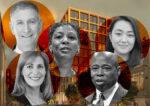Nimbyism in Homecrest is threatening to derail a mixed-use project, which includes 60 affordable housing units. Enter Mayor Eric Adams.
Adams spoke to the City Council member who represents the area and opposes the Plaza Realty project, Politico reported. During the conversation, Adams expressed his desire to get the project over the finish line.
Plaza Realty proposes replacing a Staples and a parking lot at 1880 Coney Island Avenue with an eight-story complex with 231 housing units, first-floor commercial space and a landscaped rear garden.
The 36,000-square-foot development would have the largest affordable housing component in Community District 12 in eight years. But the local community board — which has repeatedly claimed that housing affordability is its most pressing issue — unanimously rejected the project in October over height concerns, architectural inconsistency and traffic.
An additional concern is that the project’s mostly small apartments are a mismatch for the community’s predominantly large families.
Brooklyn Borough President Antonio Reynoso supports the project, but Council member Kalman Yeger, who is not a fan of the developer’s, said he won’t unless the community board does. That’s a problem for Plaza because the City Council typically defers to the local representative on land use decisions.
The community has a history of rejecting affordable housing. In June, the board thwarted a project at 1571 McDonald Avenue that called for 104 apartments, 37 of which would have been permanently affordable.
Pressure from the mayor and Council Speaker Adrienne Adams helped overcome such opposition twice last year, though. Controversial plans in the Throggs Neck section of the Bronx and in Astoria, Queens, were pushed through after the two exerted their influence.
It will soon be known whether that turns out to be enough in Homecrest: The City Council is slated to vote on the rezoning this month. If Yeger senses that his colleagues — most of whom are far more progressive than he — will not back up his rejection of the rezoning, he could be forced to negotiate a compromise.
The Real Estate Board of New York estimates the city needs 560,000 new housing units by 2030.
— Holden Walter-Warner
Read more



